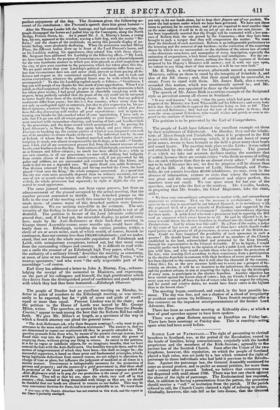The people of Leith have followed the excellent example set
than
by their neighbours of Edinburgh. On Monday, they and the inhabi- tants of II usselburgh and Portobello, whom it is proposed in the Bill to join with them, held a meeting, which, if it did not boast of many great names, seems to have brought to the field a great many clear heads and sound hearts. The meeting took place on the Links : it was called and attended by the whole of the Leith .Magistrates. The journal fr:aa which we take our account, declines stating the numbers that at tended, because there are certain critics "who think no more of telling- lies on such subjects than they do on almost every other." If truth is not to he told because lies are, we fear its progress will be slower than that of the Bill. As the towns of Leith, Musselburgh, and Porto- bello, do not contain less than 40,000 inhabitants, we may, even in the absence Of information, venture to state, that where the enthusiasm NV1IS great and the unanimity of sentiment and object perfect, the numbers were not small. We can spare room for but one of the speeches, and we take the first as the readiest. Mr. Cassilis, banker, in proposing that Mr. Sceales, the Chief Magistrate, take the chair, said-
" We have very extraordinary antagonists to combat with, and extraordinary
arguments to overcome. They say the measure is revolutionary. Gan any measure be so that is sanctioned by our beloved Monarch, is in accordance with the expressed wish of a great majority of Parliament, and supported by the whole executive power of the Government ? Another extraordinary objection has been made. A noble Lord who took a prominent lead iu opposite"b the Bill used an argument which coine home to us all. He said he objected to it, be- cause it would throw the elective franchise in Scotland into the hands of bigoted Presbyterians. And by whom was this said ? By a Peer of the realm, a judge- of the court of last resort, and an enacter of tliose laws which should confer equal justice on all persons of all persuasions, in every corner of the British na- tion. Could we have imagined the possibility of such ignorance in such a quarter? He should know that we are, most of us, members of the Church established. in the land, acknowledged and protected by the King himself, through his representative in the General Assembly. If we be bigots, I would certainly prefer such bigotry to the opiuion of such a noble Lord, and those who join with him, and who would exclude those who live under the protection of the law, who worship Ged according to their conscience, from a participation in the elective franchise in common with their brethren of every persuasion. It has been objected to the measure, that it will alter the character of the country. I deny this ; for, as the new measure holds out to every one a prospect of be- coming an elector, it will be an incentive to the industrious, the economical, and the prudent artisan, to aim at acquiring the right, I may say the birthright of every man, to participate in the elective franchise. Another objection has been started against the lowest class of voters ; but, my friends, I believe that if every man was struck off from the list of voters who has no respect for religion, and for moral and relative duties, we would have fewer voters in the highest than in the lowest class."
The meeting began, continued, and ended, in the best possible hu- mour. The day was fine, and not a shadow of a cloud of irregularity or accident came across its brilliancy. These Scotch meetings offer a fine comment on the impudent misrepresentations of the former Lord. Advocate, Rae.
There has been an excellent meeting at Kirkcaldy also ; at which a host of good speeches appear to have been spoken.
There WAS a iciest Reform meeting at Dumfries on Friday last. There have been meetings at Paisley also. This is reacting—acting
again what had been acted before. ,



























 Previous page
Previous page